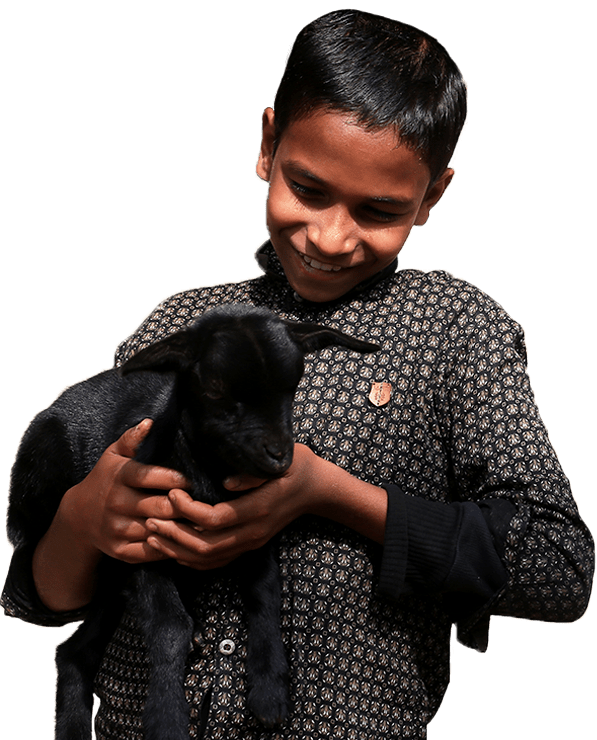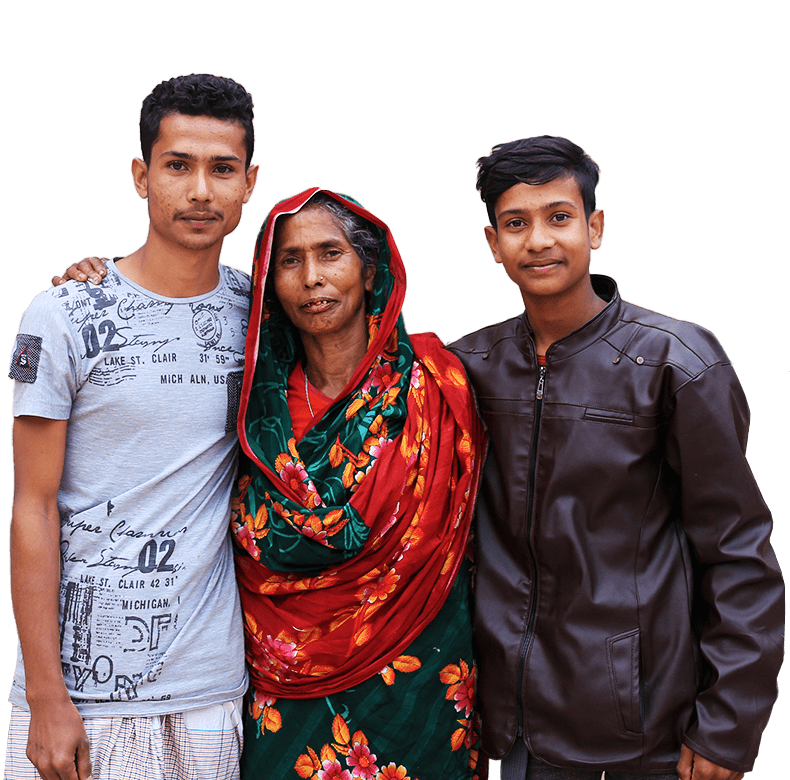Discover more about your Child Partner’s community.

Our Child Partner communities face many challenges. Thanks to the work of our Partners, there’s also positive change to celebrate. Find out more about what’s happening in these countries.
Population: 167 million
Official language: Bangla
88% Muslim
Last year, the north-east regions of Bangladesh experienced monsoon rains causing severe floods. Many families lost their homes, farmland was destroyed, and 3.5 million children were left without clean drinking water. Flooding also damaged sanitation facilities increasing the risk of water borne disease. By 2050, it’s estimated that one in every seven people in Bangladesh will be displaced due to similar environmental and climate related disasters.
The effects of the Russia-Ukraine war are being felt by communities in Bangladesh as inflation worsens, making it difficult to afford food. This is having devastating effects on the poorest and most vulnerable. Around 30 per cent of people in Bangladesh are facing food insecurity, despite the country’s economy having recovered from the shocks caused by the pandemic.
With the support of our Partners across Bangladesh, many people have shown resilience during difficult times by creating alternate income streams, such as growing vegetables and raising goats. In 2022, 9,045 vulnerable people in one project—including women, children, and people with disability—developed basic skills for life. Most of the children in this project are now attending school, accessing health services, and living without abuse from family or community members.
Population: 16.9 million
Official language: Khmer
97% Buddhist
The COVID situation improved in Cambodia last year with high vaccination rates, markets re-opening, and children returning to school. Unfortunately, many families continue to bear the impact of lockdowns, along with other challenges to their livelihood. Many people are still experiencing a loss in income and struggle to meet family needs, especially as food and energy prices continue to rise. Rates of school closures, school dropouts, and child marriage increased in Cambodia because of COVID. Although schools are now open, teachers have reported that many children are behind in their learning outcomes, as they were unable to cope with home-based learning, or access lessons without a device or internet.
Farmers have struggled due to changes to the weather—from drought in 2021 that destroyed many crops, to daily rain in 2022 that prevented them from preparing for the rice growing season.
Our local Partners are continuing to encourage families to ensure students return to school. They’re working with communities to help improve and diversify income. Our Partners are training farmers in agriculture, women are joining savings groups, and children are learning about their rights in Child Clubs.
One of our Cambodian Partners is also helping 11 communities identify and assist families at high risk of human trafficking, sexual abuse, and unsafe migration. This year, thousands of vulnerable people were taught how to decrease their risk and work together to protect each other.
Population: 21 million
Official languages: English/Chichewa
60% Christian
Our Partner in Malawi has the goal of creating an environment in which children are free and safe to effectively participate in public life, development, survival, and protection initiatives. The program is motivated by the idea that children, youth, and other vulnerable groups thrive when there are opportunities for them to engage meaningfully in the life of their community.
Agricultural land makes up 59 per cent of Malawi and 80 per cent of the population is employed in agriculture. Rapid population growth and high population density is putting pressure on Malawi’s land, water, and forest resources. Reduced plot sizes and increasing vulnerability to climate change further threaten the sustainability of Malawi’s agriculturally based economy and will worsen food shortages.
In Malawi it is common for families to remove their children, particularly girls, from school early because they cannot meet the cost of school fees and requirements. This leaves many young people vulnerable to child labour, child marriage, and various other child abuse.
Thanks to our Partner’s hard work in establishing Child Protection Committees, there’s been a significant decrease in child marriages and abuse in Malawi. Reporting abuse has also become easier due to a strengthened referral system. Greater access to education and quality public health services has also led to improvements in maternal and child health.
Population: 30.9 million
Official language: Nepali
81% Hindu
Last year, the COVID crisis in Nepal eased as vaccination rates rose, and lockdowns came to an end. But many rural communities continue to feel its impact, especially given the lack of jobs and inadequate infrastructure in rural villages. Children from low-income families were unable to access online classes during lockdown, widening the gap in learning outcomes. People with disability also struggled to earn an income due to discrimination, leaving them dependent on their families—many of whom are living in poverty.
Another challenge is that many people in the rural flat lands (Terai) of Nepal—especially those from marginalised groups— don’t have citizenship, birth registrations or identification documents. This leaves them unable to rely on social and legal protections, exercise their political rights, or access social services from the government.
Nepal regularly experiences environmental disasters. The impacts of climate change is evident in agriculture and on people’s wellbeing. Dengue and other mosquito-borne disease outbreaks are projected to become more widespread and severe in Nepal because of warming temperatures.
In 2022, many vulnerable people in communities our Partners serve took vital steps towards improving their lives. People from marginalised groups obtained identification documents from the government, more women have taken on decision-making roles, both at home and in their communities, and new mothers are receiving training on how to take care of their child’s health. Our Partners are supporting rural schools with resources and technical support, so more children living in poverty can get an education. Child Clubs help young people understand their rights, take care of their health, and build a better future for themselves, and their families.
Population: 47.7 million
Official languages: English
45% Protestant
Amid an unprecedented hunger crisis, communities in Uganda face several barriers to providing the basics for their families. A continuous dry spell has hampered people’s ability to produce enough food to eat or earn an income, while food and fuel prices continue to rise with inflation—beyond what many can afford. Our Partner anticipates that more people will face severe food shortages in the near future. Many children in Uganda are forced to work to earn money for their families, and many girls have married at a young age and are no longer attending school.
Our Partner is helping communities in Uganda build resilience to these pressures. They’re helping vulnerable people—including women and young adults—find ways to diversify their income sources, so they can provide for their families and plan for a better future. And they’re helping farmers improve their agriculture to better withstand drought and improve productivity.
Our Partner is also helping children build their confidence with more opportunities to play, continue their education, and develop leadership skills. According to staff members, more children and young people are taking part in decision-making processes and are now more empowered by adults in the community who recognise their rights.
Last Updated: 12 June 2023.
I thank the Project for supporting our community and I request that they continue to train other children for the betterment of the community and country, and for our own confidence.
Looking to know more about child sponsorship? Find the answer to your question on our Sponsorship Frequently Asked Question page.
LEARN MORE
